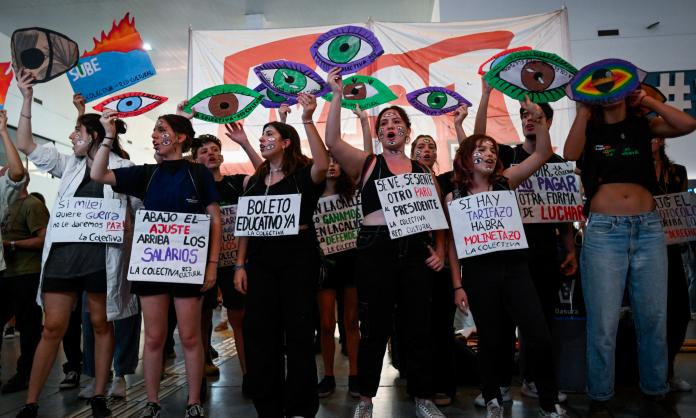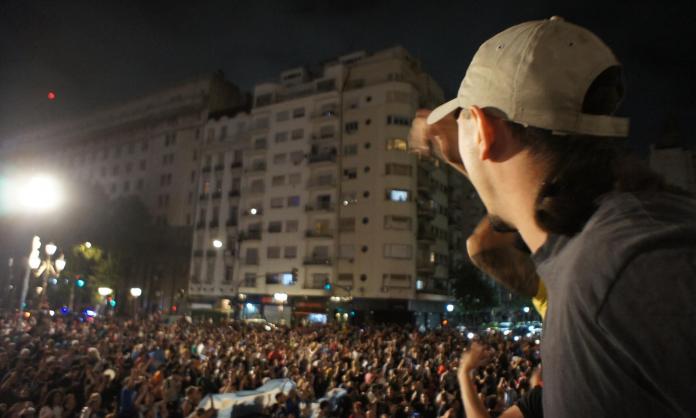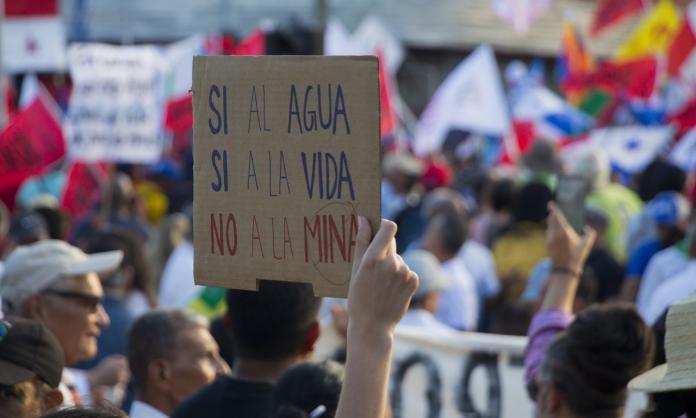This year Chile marks 40 years since Pinochet’s bloody coup of 11 September 1973. The coup brought the ideas of Milton Friedman and the “Chicago school” of economics into practice. After four decades of economic restructuring, Chile remains a model for neoliberalism.
On 1 July the World Bank changed the country’s classification to high-income country. Most Chileans might not feel it, but they are now mixing with the First World. Chile is the poster child of neoliberalism, and the World Bank seemed keen to make some ceremony around the 1 July announcement, but the right wing government of Sebastián Piñera was careful not to make much fuss.
Only 10 days after the World Bank’s announcement, Chile’s Central Unitaria de Trabajadores union federation organised a general strike. Ninety percent of public sector workers participated, along with mining, maritime, transport, retail and other private sector workers.
Demonstrations dotted the length of the country. In the northern cities of Arica and Iquique services were paralysed, in Antofagasta streets were occupied, and in Calama and Rancagua entrances to major mines were blockaded.
In the capital Santiago, barricades were set up at multiple points, and clashes between police heavily armed with tear gas and water cannons and the encapuchados (hooded, masked youth) resulted in more than 20 arrests and an unknown number of people injured.
Student movement
That no one in Chile is keen on celebrating neoliberalism’s success is due largely to the impact of a student movement that, since the secondary students’ “penguin rebellion” of 2006, has progressively undermined the political consensus. The movement has exposed the impact of neoliberalism on Chilean workers and articulated a general critique of the market. It has revived the ideological battle, which the organised left had failed to do.
Through the privatisation of the old economy and a new phase of “primitive accumulation” in the resources sector, neoliberalism has increased the size of the Chilean pie, but only to satisfy the gluttony of the capitalists.
Over the last decade, Chile’s GDP growth has averaged 4-5 percent but the big corporations have grown at rates of over 20 percent. The neoliberal economy runs at multiple velocities, producing increasingly obscene concentrations of wealth and social polarisation.
Over this same period, the top 1 percent has secured around 33 percent of total national income, while the top 0.1 percent is getting nearly 20 percent of the whole pie, almost twice as much as their counterparts in the US.
More than 80 percent of the population have incomes one 40th of those of the richest 1 percent. Chile’s “success” has moved it from among the 20 most unequal countries in the world to one of the 10 most unequal.
An overwhelming majority live on less than $US1,000 a month while paying First World prices for goods as basic as milk. Much of the working class lives closer to the minimum wage of $US400 a month.
Entrenching inequality
Far from delivering promised social mobility, neoliberal education entrenches inequality. School and tertiary enrolments have significantly increased over the last three decades. But again, the winners are the capitalists and the richer middle class.
Since 1981, enrolments in the public education system have decreased from 78 percent of the total to less than 50 percent. This segregated education – more segregated than in any other OECD country – ensures that only about 20 percent of those enrolling in universities are from lower socioeconomic backgrounds. Additionally, most working class and lower middle class tertiary students are likely to have to pay to attend a second-rate private university.
Poor kids attend massively underfunded public schools, while many working and middle class families struggle to send their kids to private schools, paying for an education that comes with decreasing chances of success. Graduating young people enter a highly competitive labour market, where wages and conditions have been degraded by decades of anti-labour laws and productivity “reforms”.
The student movement has forced this most “successful” neoliberalism onto the back foot. Even the UDI, one of the two main right wing parties of government, is going to the November presidential elections with the slogan “For a more just Chile”.
Only a few weeks before the recent general strike, the federation of university student unions (CONFECH) organised a 100,000-strong mobilisation in Santiago. Along with the important student unions of the University of Chile and Catholic University, CONFECH also supported the general strike.
The president of the University of Chile student union, Diego Vela, said, “We support the general strike because we understand that the only way of building a different Chile is to start with this unity, and that today it is the majority of the country that lives with injustice in health, education and in the workplace and a minority that takes advantage of this.”
Because of this looming crisis, the Socialist Party’s Michelle Bachelet, heading the Concertación coalition of Christian Democracy and various centrists and social democratic parties, will likely win the coming presidential elections. This is neoliberalism’s best card: to mimic Brazil, Uruguay and Argentina, where social democratic-style governments have implemented social policies to alleviate the worst poverty while leaving the neoliberal structures intact.
Whether this will succeed in Chile, and for how long, will depend on both the economic fortunes of the country and the ability of the movements and the left to build a fighting alternative.










